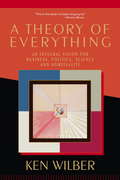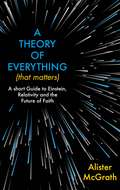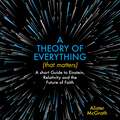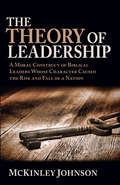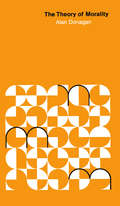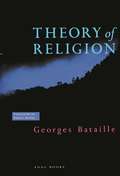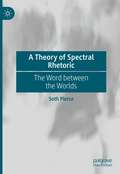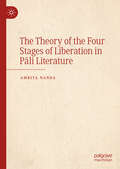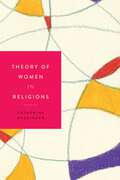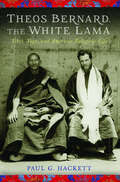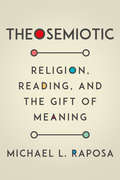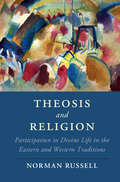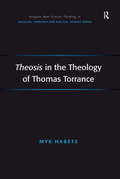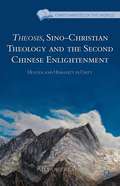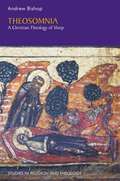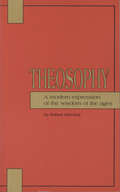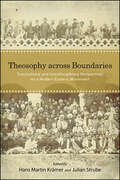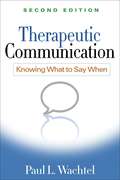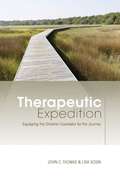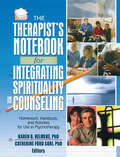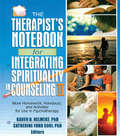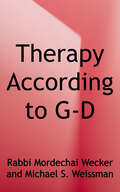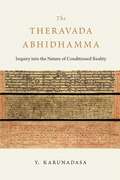- Table View
- List View
A Theory of Everything: An Integral Vision for Business, Politics, Science and Spirituality
by Ken WilberHere is a concise, comprehensive overview of Wilber's revolutionary thought and its application in today's world. In A Theory of Everything, Wilber uses clear, nontechnical language to present complex, cutting-edge theories that integrate the realms of body, mind, soul, and spirit. He then demonstrates how these theories and models can be applied to real-world problems in areas such as politics, medicine, business, education, and the environment. Wilber also discusses daily practices that readers take up in order to apply this integrative vision to their own everyday lives.
A Theory of Everything (That Matters): A Short Guide to Einstein, Relativity and the Future of Faith
by Dr Alister E McGrathOn 29th May 1919, British astronomers tested Einstein's theory of relativity by measuring the path of the stars travelling near the sun during an eclipse. On 7th November 1919, the results of that experiment were announced in London, proving Einstein's theory of relativity. A Theory of Everything (that Matters) has been written in celebration of this 100th anniversary. With the confirmation of Einstein's theories at the beginning of the twentieth century, our understanding of the universe became much more complex. What does this mean for religious belief, and specifically Christianity? Does it mean, as so many people assume, the death of God? In A Theory of Everything (that Matters) Alister McGrath - Professor of Science and Religion at Oxford University - explores these questions, giving an overview of Einstein's thought and scientific theories, including his nuanced thinking on the difference between the scientific enterprise and beliefs outside its realm. This groundbreaking book is for anyone intrigued by Einstein as one of the twentieth century's most iconic figures, who wants to know what his theories mean for religion, and who is interested in the conversation between science and religions more broadly.'An excellent study of Einstein's theories in relation to his beliefs about God' - starred review in PUBLISHERS WEEKLY
A Theory of Everything (That Matters): A Short Guide to Einstein, Relativity and the Future of Faith
by Dr Alister E McGrathAn overview of Einstein's theories and what they mean for Christian belief, published on the 100th anniversary of the confirmation of the theory of relativity.On 29th May 1919, British astronomers tested Einstein's theory of relativity by measuring the path of the stars travelling near the sun during an eclipse. On 7th November 1919, the results of that experiment were announced in London, proving Einstein's theory of relativity. A Theory of Everything (that Matters) has been written in celebration of this 100th anniversary. With the confirmation of Einstein's theories at the beginning of the twentieth century, our understanding of the universe became much more complex. What does this mean for religious belief, and specifically Christianity? Does it mean, as so many people assume, the death of God? In A Theory of Everything (that Matters) Alister McGrath - Professor of Science and Religion at Oxford University - explores these questions, giving an overview of Einstein's thought and scientific theories, including his nuanced thinking on the difference between the scientific enterprise and beliefs outside its realm. This groundbreaking book is for anyone intrigued by Einstein as one of the twentieth century's most iconic figures, who wants to know what his theories mean for religion, and who is interested in the conversation between science and religions more broadly.(P) 2019 Hodder & Stoughton Ltd
The Theory of Leadership: A Moral Construct of Biblical Leaders Whose Character Caused the Rise and Fall of a Nation
by McKinley JohnsonCan you imagine hearing a newly elected official taking the following oath of office: &“Do you solemnly swear that if you are not here to help us you at least won't hurt us?&” That may sound far-fetched, but it isn&’t. For the strength of any nation is directly related to the overall well-being of its citizens. In God&’s eyes, how well a nation's leaders treat those who have been marginalized by the larger society has more to do with the country&’s rise or fall than its political, military, or intellectual might. If you are concerned for the plight of humanity, this book is for you. Though written from a leader&’s perspective, its biblical principles and practices are universal. You will see which personal characteristics cause a leader to rise or fall. From that, you will gain valuable leadership tools for yourself by learning how other leaders have been able to garner the favor of God during difficult leadership situations.
The Theory of Morality
by Alan Donagan"Let us . . . nominate this the most important theoretical work on ethical or moral theory since John Rawls's Theory of Justice. If you have philosophical inclinations and want a good workout, this conscientious scrutiny of moral assumptions and expressions will be most rewarding. Donagan explores ways of acting in the Hebrew-Christian context, examines them in the light of natural law and rational theories, and proposes that formal patterns for conduct can emerge. All this is tightly reasoned, the argument is packed, but the language is clear. "—Christian Century "The man value of this book seems to me to be that it shows the force of the Hebrew-Christian moral tradition in the hands of a creative philosopher. Throughout the book, one cannot but feel that a serious philosopher is trying to come to terms with his religious-moral background and to defend it against the prevailing secular utilitarian position which seems to dominate academic philosophy. "—Bernard Gert, Journal of Medicine and Philosophy
Theory Of Religion
by Georges Bataille Robert HurleyTheory of Religion brings to philosophy what Georges Bataille's earlier book The Accursed Share brought to anthropology and history, namely, an analysis based on notions of excess and expenditure. No other work of Bataille's, and perhaps no other work anywhere since Weber's Protestant Ethic and the Spirit of Capitalism, has managed to draw so incisively the links between man's religious and economic activities. <p><p> "Religion," according to Bataille, "is the search for a lost intimacy." In a brilliant and tightly reasoned argument, he proceeds to develop a "general economy" of man's relation to this intimacy: from the seamless immanence of animality to the shattered world of objects and the partial, ritual recovery of the intimate order through the violence of the sacrifice. Bataille then reflects on the archaic festival, in which he sees not only the glorious affirmation of life through destructive consumption but also the seeds of another, more ominous order -- war. <p> Bataille then traces the rise of the modern military order, in which production ceases to be oriented toward the destruction of a surplus and violence is no longer deployed inwardly but is turned to the outside. In these twin developments one can see the origins of modern capitalism.
A Theory of Spectral Rhetoric: The Word between the Worlds
by Seth PierceThis book synthesizes Jacques Derrida’s hauntology and spectrality with affect theory, in order to create a rhetorical framework analyzing the felt absences and hauntings of written and oral texts. The book opens with a history of hauntology, spectrality, and affect theory and how each of those ideas have been applied. The book then moves into discussing the unique elements of the rhetorical framework known as the rhetorrectional situation. Three case studies taken from the Christian tradition, serve to demonstrate how spectral rhetoric works. The first is fictional, C.S. Lewis ’The Great Divorce. The second is non-fiction, Tim Jennings ’The God Shaped Brain. The final one is taken from homiletics, Bishop Michael Curry’s royal wedding 2018 sermon. After the case studies conclusion offers the reader a summary and ideas future applications for spectral rhetoric.
The Theory of the Four Stages of Liberation in Pāli Literature
by Amrita NandaThis book investigates the origins and development of the theory of four stages of liberation in Pāli literature. This theory is an important soteriological cartography in early Buddhism, particularly Theravāda Buddhism. Amrita Nanda challenges the traditional interpretation of the four stages by recognizing the impact of the changing socio-religious factors on the theory’s origins and subsequent development. Based primarily on the Pali literary sources, this study utilizes sometimes-overlooked aspects of these texts. This book first traces the origins of each stage individually; then, it traces the formation of the theory and its subsequent development.
Theory of Women in Religions (Women in Religions #4)
by Catherine WessingerAn introduction to the study of women in diverse religious culturesWhile women have made gains in equality over the past two centuries, equality for women in many religious traditions remains contested throughout the world. In the Roman Catholic Church and the Church of Jesus Christ of Latter-day Saints women are not ordained as priests. In areas of Pakistan and Afghanistan under Taliban occupation girls and women students and their teachers risk their lives to go to school. And in Sri Lanka, fully ordained Buddhist nuns are denied the government identity cards that recognize them as citizens. Is it possible to create families, societies, and religions in which women and men are equal? And if so, what are the factors that promote equality?Theory of Women in Religions offers an economic model to shed light on the forces that have impacted the respective statuses of women and men from the earliest developmental stages of society through the present day. Catherine Wessinger integrates data and theories from anthropology, archaeology, sociology, history, gender studies, and psychology into a concise history of religions introduction to the complex relationship between gender and religion. She argues that socio-economic factors that support specific gender roles, in conjunction with religious norms and ideals, have created a gendered division of labor that both directly and indirectly reinforces gender inequality. Yet she also highlights how as the socio-economic situation is changing religion is being utilized to support the transition toward women’s equality, noting the ways in which many religious representations of gender change over time.
Theos Bernard, the White Lama: Tibet, Yoga, and American Religious Life
by Paul HackettIn 1937, Theos Casimir Bernard (1908–1947), the self-proclaimed "White Lama," became the third American in history to reach Lhasa, the capital city of Tibet. During his stay, he amassed the largest collection of Tibetan texts, art, and artifacts in the Western hemisphere at that time. He also documented, in both still photography and 16mm film, the age-old civilization of Tibet on the eve of its destruction by Chinese Communists. Based on thousands of primary sources and rare archival materials, Theos Bernard, the White Lama recounts the real story behind the purported adventures of this iconic figure and his role in the growth of America's religious counterculture. Over the course of his brief life, Bernard met, associated, and corresponded with the major social, political, and cultural leaders of his day, from the Regent and high politicians of Tibet to saints, scholars, and diplomats of British India, from Charles Lindbergh and Franklin Delano Roosevelt to Gandhi and Nehru. Although hailed as a brilliant pioneer by the media, Bernard also had his flaws. He was an entrepreneur propelled by grandiose schemes, a handsome man who shamelessly used his looks to bounce from rich wife to rich wife in support of his activities, and a master manipulator who concocted his own interpretation of Eastern wisdom to suit his ends. Bernard had a bright future before him, but disappeared in India during the communal violence of the 1947 Partition, never to be seen again.Through diaries, interviews, and previously unstudied documents, Paul G. Hackett shares Bernard's compelling life story, along with his efforts to awaken America's religious counterculture to the unfolding events in India, the Himalayas, and Tibet. Hackett concludes with a detailed geographical and cultural trace of Bernard's Indian and Tibetan journeys, which shed rare light on the explorer's mysterious disappearance.
Theos Bernard, the White Lama: Tibet, Yoga, and American Religious Life
by Paul G. HackettThe life and adventures of an American explorer and iconic figure in the 20th century religious counterculture movement.In 1937, Theos Casimir Bernard, the self-proclaimed &“White Lama,&” became the third American in history to reach Lhasa, the capital city of Tibet. During his stay, he amassed the largest collection of Tibetan texts, art, and artifacts in the Western hemisphere at that time. He also documented, in both still photography and 16mm film, the age-old civilization of Tibet on the eve of its destruction by Chinese Communists. Based on thousands of primary sources and rare archival materials, this is the real story behind the purported adventures of Bernard and his role in the growth of America's religious counterculture. Over the course of his brief life, Bernard met, associated, and corresponded with the major social, political, and cultural leaders of his day, from the Regent and high politicians of Tibet to saints, scholars, and diplomats of British India, from Charles Lindbergh and Franklin Delano Roosevelt to Gandhi and Nehru. Although hailed as a brilliant pioneer by the media, Bernard also had his flaws. He was an entrepreneur propelled by grandiose schemes, a handsome man who shamelessly used his looks to bounce from rich wife to rich wife in support of his activities, and a master manipulator who concocted his own interpretation of Eastern wisdom to suit his ends. Bernard had a bright future before him but disappeared in India during the communal violence of the 1947 Partition, never to be seen again.&“Well-written…A readable intellectual account of the life of an ambitious Tibetological pioneer.&”—Asian Ethnology
Theosemiotic: Religion, Reading, and the Gift of Meaning
by Michael L. RaposaIn Theosemiotic, Michael Raposa uses Charles Peirce’s semiotic theory to rethink certain issues in contemporary philosophical theology and the philosophy of religion. He first sketches a history that links Peirce’s thought to that of earlier figures (both within the tradition of American religious thought and beyond), as well as to other classical pragmatists and to later thinkers and developments. Drawing on Peirce’s ideas, Raposa develops a semiotic conception of persons/selves emphasizing the role that acts of attention play in shaping human inferences and perception. His central Peircean presuppositions are that all human experience takes the form of semiosis and that the universe is “perfused” with signs. Religious meaning emerges out of a process of continually reading and re-reading certain signs.Theology is explored here in its manifestations as inquiry, therapy, and praxis. By drawing on both Peirce’s logic of vagueness and his logic of relations, Raposa makes sense out of how we talk about God as personal, and also how we understand the character of genuine communities. An investigation of what Peirce meant by “musement” illuminates the nature and purpose of prayer. Theosemiotic is portrayed as a form of religious naturalism, broadly conceived. At the same time, the potential links between any philosophical theology conceived as theosemiotic and liberation theology are exposed.
Theosis and Religion: Participation in Divine Life in the Eastern and Western Traditions (Cambridge Studies in Religion, Philosophy, and Society)
by Norman RussellTheosis, originally a Greek term for Christian divinisation or deification, has become a vogue word in modern theology. Although recent publications have explored its meaning in a selection of different contexts, this is the first book to offer a coherent narrative of how the concept of theosis developed in both its Eastern and Western versions. Norman Russell shows how the role of Dionysius the Areopagite was pivotal, not only in Byzantium but also in the late mediaeval West, where it strengthened the turn towards an individualistic interiority. Russell also relates theosis to changing concepts of religion in the modern age. He investigates the Russian version of theosis, introduced in the West by Russian members the Paris School after the 1917 Revolution. Since then, theosis has undergone additional development through the addition of esoteric elements which have since passed into the mainstream of all theological traditions and even into popular spirituality.
Theosis in the Theology of Thomas Torrance (Routledge New Critical Thinking in Religion, Theology and Biblical Studies)
by Myk HabetsTorrance's vision of Theosis (deification/divinisation) is explored through his doctrine of creation and anthropology, his characterisation of the incarnation, his accounts of reconciliation and union with Christ, and his theology of church and sacraments. Myk Habets' study distinguishes Torrance's Reformed vision of theosis from other possible accounts of salvation as divinisation as they are found, for instance, within patristic thought and Eastern Orthodoxy. This book presents the first critique of the theology of T.F.Torrance to focus on theosis, and examines a model of theosis within the realm of reformed theology built upon Western theology.
Theosis, Sino-Christian Theology and the Second Chinese Enlightenment
by Alexander ChowFor a millennium and a half, Christianity in China has been perceived as a foreign religion for a foreign people. Yet in the last hundred years, various attempts to articulate a Chinese Christianity have been made by indigenous leaders like Watchman Nee, T. C. Chao and K. H. Ting. This book examines these and other historical approaches, and highlights their tendencies to draw from Western or Latin forms of Christian theology. Alexander Chow is sensitive to the ideological resources of China's past and present, and shows the potential role of Eastern Orthodox theology in today's development of an authentic Chinese contextual theology.
Theosomnia: A Christian Theology Of Sleep
by Andrew BishopSleep occupies around one third of a person's life and is the subject of research across many disciplines. In this groundbreaking new monograph, Andrew Bishop explores sleep by creatively drawing on resources of the Christian tradition. Sleep is a subject which demands theological attention, because of the central place it occupies in contemporary reflection on what it is to be human. Offering original research, this book investigates sleep for the first time from a theological position, looking at all key questions that a theological treatment of sleep raises, including issues of identity and personhood, sleep and mortality, resurrection, and renewal and healing.
Theosophy
by Robert EllwoodA professor of religion explores Theosophical ideas in modern times. Major concepts discussed include reincarnation, karma, evolution, the Oneness of all life, the cyclic nature of creation, and the mystery of consciousness.
Theosophy
by Robert EllwoodA professor of religion explores Theosophical ideas in modern times. Major concepts discussed include reincarnation, karma, evolution, the Oneness of all life, the cyclic nature of creation, and the mystery of consciousness.
Theosophy across Boundaries: Transcultural and Interdisciplinary Perspectives on a Modern Esoteric Movement (SUNY series in Western Esoteric Traditions)
by Hans Martin Krämer Julian StrubeTheosophy across Boundaries brings a global history approach to the study of esotericism, highlighting the important role of Theosophy in the general histories of religion, science, philosophy, art, and politics. The first half of the book consists of seven perspectives on the activities of the Theosophical Society in very different regional contexts, ranging from India, Vietnam, China, and Japan to Victorian Britain and Israel, shedding new light on the entanglement of "Western" and "Oriental" ideas around 1900. The second half explores specific cultural influences that Theosophy exerted in the spheres of literature, art, and politics, using case studies from Sri Lanka, Burma, India, Japan, Ireland, Germany, and Russia. The examples clearly show that Theosophy was part of a truly global movement, thus providing an outstanding example of the complex entanglements of the global religious history of the nineteenth and early twentieth centuries.
Therapeutic Communication, Second Edition
by Paul WachtelA uniquely practical guide and widely adopted text, this book shows precisely what therapists can say at key moments to enhance the process of healing and change. Paul Wachtel explains why some communications in therapy are particularly effective, while others that address essentially the same content may actually be countertherapeutic. He offers clear and specific guidelines for how to ask questions and make comments in ways that facilitate collaborative exploration and promote change. Illustrated with vivid case examples, the book is grounded in an integrative theory that draws from features of psychodynamic, cognitive-behavioral, systemic, and experiential approaches. New to This Edition Reflects nearly 20 years of advances in the field and refinements of the author's approach. Broader audience: in addition to psychodynamic therapists, cognitive-behavioral therapists and others will find specific, user-friendly recommendations. Chapter on key developments and convergences across different psychotherapeutic approaches. Chapter on the therapeutic implications of attachment theory and research.
Therapeutic Expedition: Equipping The Christian Counselor For The Journey
by John C. Thomas Lisa SosinFor undergraduates and those pursuing a master's degree in counseling, psychology, social work, or pastoral counseling, Therapeutic Expedition is the only comprehensive basic helping skills textbook built upon a biblical world-view. Authors John C. Thomas and Lisa Sosin pull from their combined fifty years of clinical and classroom experience to prepare future counselors for their professional journey, fostering specific skills application in the areas of: Creating a helping relationship Assigning homework Exploring the counselee's concerns Spiritual strategies Facilitating the sessions Using metaphors Assessing the counselee The book's unique combination of qualities-a practical approach highlighting professional and personal growth based on authoritative, interdisciplinary, and biblical worldview outlooks-makes this an outstanding text within its field. Workbook excercises to foster skills application are included with each chapter.
The Therapist's Notebook for Integrating Spirituality in Counseling I: Homework, Handouts, and Activities for Use in Psychotherapy
by Karen B. Helmeke Catherine Ford SoriLearn to initiate the integration of your clients’ spirituality as an effective practical intervention. A client’s spiritual and religious beliefs can be an effective springboard for productive therapy. How can a therapist sensitively prepare for the task? The Therapist’s Notebook for Integrating Spirituality in Counseling is the first volume of a comprehensive two-volume resource that provides practical interventions from a wide range of backgrounds and theoretical perspectives. This volume helps prepare clinicians to undertake and initiate the integration of spirituality in therapy with clients and provides easy-to-follow examples. The book provides a helpful starting point to address a broad range of topics and problems. The chapters of The Therapist’s Notebook for Integrating Spirituality in Counseling are grouped into five sections: Therapist Preparation and Professional Development; Assessment of Spirituality; Integrating Spirituality in Couples Therapy; Specific Techniques and/or Topics Used in Integrating Spirituality; and Use of Scripture, Prayer, and Other Spiritual Practices. Designed to be clinician-friendly, each chapter also includes sections on resources where counselors can learn more about the topic or technique used in the chapter—as well as suggested books, articles, chapters, videos, and Web sites to recommend to clients. Each chapter utilizes similar formatting to remain clear and easy-to-follow that includes objectives, rationale for use, instructions, brief vignette, suggestions for follow-up, contraindications, references, professional readings and resources, and bibliotherapy sources for the client. The first volume of The Therapist’s Notebook for Integrating Spirituality in Counseling helps set a solid foundation and provides comprehensive instruction on: ethically incorporating spirituality into the therapeutic setting professional disclosure building a spiritual referral source through local clergy assessment of spirituality the spirituality-focused genogram using spirituality in couples therapy helping couples face career transitions dealing with shame addiction recovery the use of scripture and prayer overcoming trauma in Christian clients and much more! The Therapist’s Notebook for Integrating Spirituality in Counseling is a stimulating, creative resource appropriate for any clinician or counselor, from novices to experienced mental health professionals. This first volume is perfect for pastoral counselors, clergy, social workers, marriage and family therapists, counselors, psychologists, Christian counselors, educators who teach professional issues, ethics, counseling, and multicultural issues, and students.
The Therapist's Notebook for Integrating Spirituality in Counseling II: More Homework, Handouts, and Activities for Use in Psychotherapy
by Karen B. Helmeke Catherine Ford SoriMore activities to tap into the strength of your clients’ spiritual beliefs to achieve therapeutic goals. The Therapist’s Notebook for Integrating Spirituality in Counseling II is the second volume of a comprehensive two-volume resource that provides practical interventions from respected experts from a wide range of backgrounds and theoretical perspectives. This volume includes several practical strategies and techniques to easily incorporate spirituality into psychotherapy. You’ll find in-session activities, homework assignments, and client and therapist handouts that utilize a variety of therapeutic models and techniques and address a broad range of topics and problems. The chapters of The Therapist’s Notebook for Integrating Spirituality in Counseling II are grouped into four sections: Models of Therapy Used in Integrating Spirituality; Integrating Spirituality with Age-Specific Populations: Children, Adolescents, and the Elderly; Integrating Spirituality with Specific Multicultural Populations; and Involving Spirituality when Dealing with Illness, Loss, and Trauma. As in Volume One, each clinician-friendly chapter also includes sections on resources where the counselor can learn more about the topic or technique used in the chapter—as well as suggested books, articles, chapters, videos, and Web sites to recommend to clients. Every chapter follows the same easy-to-follow format: objectives, rationale for use, instructions, brief vignette, suggestions for follow-up, contraindications, references, professional readings and resources, and bibliotherapy sources for the client. The Therapist’s Notebook for Integrating Spirituality in Counseling II adds more useful activities and homework counselors can use in their practice, such as: using religion or spirituality in solution-oriented brief therapy “Cast of Character” counseling using early memories to explore adolescent and adult spirituality cognitive behavioral treatment of obsessive-compulsive disorder age-specific clients such as children or the elderly multicultural populations and spirituality dealing with illness, loss, and trauma recovering from fetal loss creative art techniques with caregivers in group counseling and much more! The Therapist’s Notebook for Integrating Spirituality in Counseling II provides even more creative and helpful homework and activities that are perfect for pastoral counselors, clergy, social workers, marriage and family therapists, counselors, psychologists, Christian counselors, educators who teach professional issues, ethics, counseling, and multicultural issues, and students.
Therapy According to G-d: A Rabbi and a Psychologist Discuss Life
by Rabbi Mordechai Wecker Michael S. WeissmanThe Torah is the Blueprint for the Universe. It is the owner's manual to life. Our mission is to learn G-d's Torah and strive to be closer to Him. Still, the Torah is even more than that. It is G-d making Himself known to the world. It has been our lifeblood for over three thousand years. It's what sustains us, keeps us alive, and gives us our sense of purpose in the world. It is eternal. It is also high drama. It is the story of relationships, conflict, and (sometimes) resolution. The Torah shares its stories to help us understand who we are and where we come from - and how we must live and grow and evolve, constantly improving ourselves, refining our character traits, and developing healthier and better relationships. Thousands of years ago and today, people have dealt with difficult issues such as anxiety, loneliness, depression, anger issues, family conflict and substance abuse. In this book, we attempt to show how eternal Torah principles can be incorporated into our daily lives - and how we can find healing and connection.
The Theravada Abhidhamma: Inquiry into the Nature of Conditioned Reality
by Y. KarunadasaA lucid explanation of the basic contours of the Theravada Abhidamma system for serious students of Buddhist thought.The renowned Sri Lankan scholar Y. Karunadasa examines Abhidhamma perspectives on the nature of phenomenal existence. He begins with a discussion of dhamma theory, which describes the bare phenomena that form the world of experience. He then explains the Abhidhamma view that only dhammas are real, and that anything other than these basic phenomena are conceptual constructs. This, he argues, is Abhidhamma’s answer to common-sense realism—the mistaken view that the world as it appears to us is ultimately real. Among the other topics discussed are the theory of double truth (ultimate and conceptual truth), the analysis of mind, the theory of cognition, the analysis of matter, the nature of time and space, the theory of momentary being, and conditional relations. The volume concludes with an appendix that examines why the Theravada came to be known as Vibhajjavada, “the doctrine of analysis.” Not limiting himself to abstract analysis, Karunadasa draws out the Abhidhamma’s underlying premises and purposes. The Abhidhamma provides a detailed description of reality in order to identify the sources of suffering and their antidotes—and in doing so, to free oneself.
